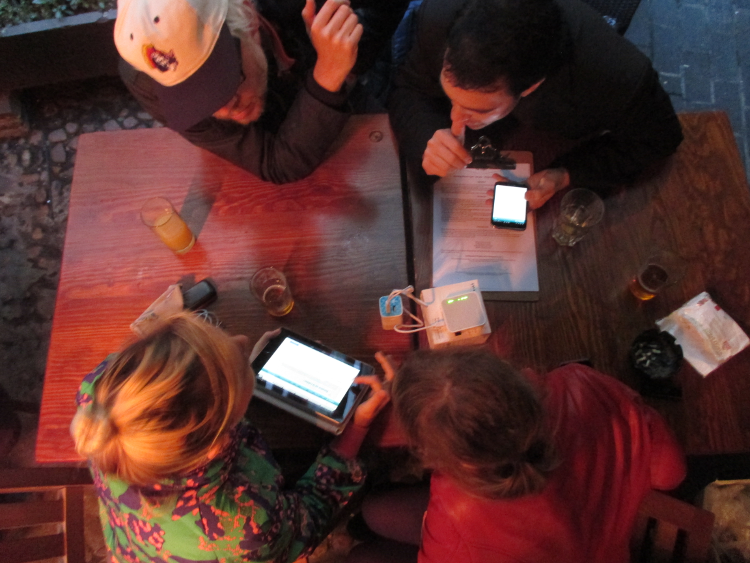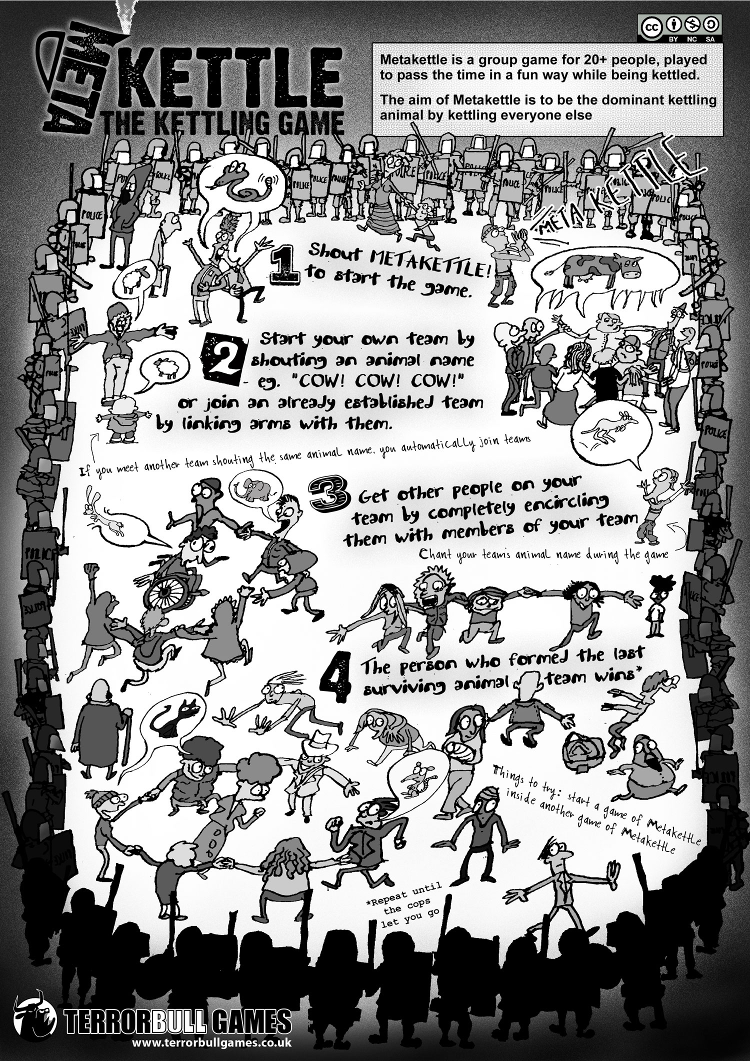TerrorBull Games plays with satire, creative commons and game theory
Published 20 May 2016 by DCALK (Paris/Bruxelles)
Andrew Sheerin, the terrible child of board games and founder of TerrorBull Games publishing, was one of the guest of Ludipunk Fest, co-organized by Dcalk & La MAD, last week-end at Jardin d’Alice in Montreuil (near Paris). Interview.
TerrorBull Games is a UK-based publisher focused on political & subversive board games. Since 2005 they are on mission “to rediscover and ressurect the forgotten tradition of using board games to tackle real life dilemmas.” Dcalk has invited Andrew Sheerin, game designer and Tom Morgan-Jones, illustrator, in Montreuil (near Paris) for a “live drawing” conference last Sunday.
You define TerrorBull Games as “an experiment in activism”, is there a game designer on board?
Yes there is! That’s me. I design all our games. War on Terror and Crunch were co-designed with a very good friend of ours, Andy Tompkins—the guy I started TerrorBull Games (TBG) with. I’m not a very traditional designer though—I rarely start with a mechanic; I tend to fixate on a theme that interests me, trying to tease out the ‘gaminess’ from it: who are the protagonists, what are their motivations, where does the conflict lie and so on. By working from the end, back, the result is a game that explains itself through how it’s played, rather than as a sort of story that’s pasted on top of a generic mechanic.

When did you get the revelation of your mission [to resurrect the forgotten tradition of board games]?
When I discovered there was such a tradition! When we released War on Terror, we thought we were slightly alone in using a board game to tackle such a difficult subject. What I subsequently learned—which was both comforting and disappointing—was that the first board game to do something similar was 5000 years old. And that even Monopoly started out as such a game. It was at that moment a lightbulb went on—we weren’t on some crazy ego trip, trying to force boardgames to be our personal propaganda tool, we were part of a long pattern and tradition of using games to interrogate and analyse the world around us. The more I researched, the more I realized that games and play in general are perfectly suited to such things. Ever since that point, what we do at TerrorBull has felt more meaningful.
Who were the people & projects, in and out the board games circle, inspiring for you at that time?
A mixed bag of political thinkers and philosophers—Chomsky, Pilger, Zizek, Chavez, Derrida, Huizinger, Caillois, Fromm… those people were all massively influential in forming both a political agenda and a philosophical framework, the combination of which found their natural expression through games. I read a lot about game theory, psychology and behavioural economics—principally Dan Ariely, whose experiments are like mini-games—which helped me massively in understanding player motivation. Latterly, game theorists like Brenda Romero, Miguel Sicart, Douglas Wilson, Bernie De Koven, Antanas Mockus and Mary Flanagan have all been hugely important—and a delight to discover.

You started TerrorBull Games by publishing the satirical board game “War On Terror” that came from the invasion of Iraq in 2003. Controversies have pushed it in the frontline, from copies being seized by the police to Roy&Moss from “The IT Crowd” playing “War On Terror”, 10 years after what do you retain?
I’ve often wondered about writing a book about it—it’s such an odd story, littered with amazing, strange, funny and wonderful people and hard-to-believe events. So much of what happened, happened purely because we made the decision to put this thing into a box. If we’d stuck it in a book, no one cares. If we danced about it, no one cares. An epic poem, no one cares. But we put it in a box and suddenly: death threats, police, global press, art galleries, museums, fans, haters… Our colourful box embraced the capitalist model and fitted in perfectly on the shelf next to all those other gentle parlour games—so perfectly in fact that the effect was jarring, shocking even. And in doing so forced many people to re-evaluate not just the nature of board games, but the subject of our game itself.
In TerrorBull Games pedigree, we also find publishing experiments in digital and print’n play formats, were you afraid of being seized once more?
Haha no, we just like to experiment. Plus those mediums allow us to get a small idea out quickly. The development time for a full board game is probably about 2 years. But a print-and-play game can be done in as little as 2 weeks.

Satirical drawings, creative commons & game theory, unusual ingredients combined in your recipe, is it the reason why you need not only to design board games but also to talk about it?
Yes definitely! The games and the theory go hand-in-hand. Without knowing what we’re trying to do with games, they are potentially going to be misunderstood—or at least not enjoyed as fully as they might be. A great example of this is Metakettle—a game that I don’t think anyone’s played at all (in the context it’s meant to be played) and yet it’s given a lot of happiness and thought to many people, not least, academics.
Where do you want to bring board game in the future?
I’m slightly obsessed with the idea of creating a pack of games for activists. Games about activism and protest have a lot of potential to not just alleviate that boredom, but bring activists more in touch with their actions; getting them to question more. I think you’re a better politician/general/activist when you can understand your oponent—and what better way than actually roleplaying your opponent. Short-term we have a couple of kickstarter projects coming up. We’re also hopefully doing more bespoke games for other people and are in the midst of some interesting chats with a couple of great charities. So we’re busy!
“A brief history of subversive & political board games”, a live-drawing conference by Andrew Sheerin & Tom Morgan-Jones, Sunday 22nd may during Ludipunk Fest at Jardin d’Alice in Montreuil.
Read more chronicles from Dcalk, an organization promoting board games as cultural objects.
